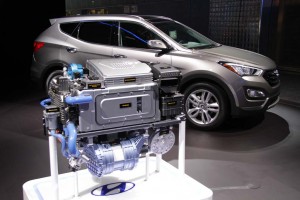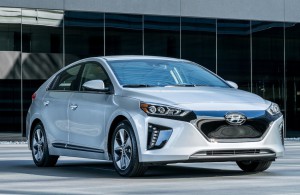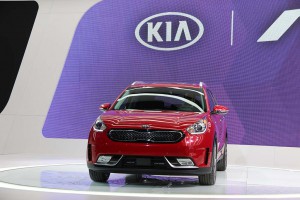Slow to charge into the electric vehicle market, Hyundai Motor Co. is about to get charged up, with an assortment of electrified models set to debut for the Hyundai and Kia brands, as well as the new Genesis luxury marque.
The three brands will add a number of new battery-electric vehicles and plug-in hybrids. Hyundai also plans to launch an all-new fuel-cell SUV model next year that, it claims, will offer greater range than any hydrogen car now on the market.
Hyundai has been slow to enter the electric vehicle market and is now racing to catch up. Key to its new program will be an all-new platform specifically dedicated to battery-based vehicles, the automaker said this week.
“The electric-vehicle platform will require high up-front investments, but we are doing this to prepare for the future,” Lee Ki-sang, the head of Hyundai’s green car operations, said at the maker’s research center in the Seoul suburb of Yongin.
(Hyundai wants you to subscribe, not buy, its new Ioniq Electric. Click Here for the story.)
Hyundai expects it will take a few more years to develop the new platform, which will likely serve as the foundation for a wide range of new battery models. It will mirror the approach taken by Tesla and a number of other manufacturers, mounting its batteries in the floorboard. That approach frees up space normally dedicated to an internal combustion engine, allowing for a large interior within a small footprint.

A fuel cell stack shown in front of the Hyundai Tucson. A longer-range hydrogen SUV is in development.
Hyundai isn’t waiting for the new platform to start pushing electric technology, however. It is in the midst of rolling out the Ioniq, the compact model to be offered in three different configurations: hybrid, plug-in and pure battery-electric. The hybrid and electric models will go on sale in April, with the plug-in set to reach U.S. showrooms in September.
The Ioniq Electric will offer relatively limited range, about 125 miles per charge. Future Hyundai and Kia BEVs are expected to more directly compete with the likes of the Chevrolet Bolt EV and Tesla Model 3, yielding 200 miles or more per charge. Kia will follow the same path, making the two brands “more competitive,” suggested Lee.
(First drive: Kia Ioniq. Click Here for the review.)
The plans call for Hyundai to add electrified models in a range of different product segments, including small cars and larger SUVs. The Genesis brand, the maker said in a statement, will get its first plug-in hybrid in 2019, with a pure battery-electric model due in 2021.
Key luxury competitors are also pushing into the electric space. Mercedes-Benz, for example, plans to have 10 plug-ins on the market by the end of this year. At its annual meeting in Berlin this week, CEO Dieter Zetsche announced that the company will speed up development of pure electric models, with 10 of those due in production by 2022. The original target was 2025.
Hyundai’s push into the electric market reflects not only competitive pressures but comes as a response to increasingly stringent global mileage and emissions standards. Even if the U.S. rolls back its own rules, as has been signaled by Pres. Donald Trump, Europe, China and the European Union are tightening their own mandates.
(Will Trump unplug EVs? Click Here for the story.)
The challenge, said Lee, will be to build demand even with a lack of the necessary support infrastructure – notably charging stations for EVs and hydrogen pumps for fuel-cell vehicles.
Nonetheless, the automaker expects to see demand start to grow over the coming decade. Lee said he expects electric vehicles to generate about 10% of global vehicle sales by 2025, a tenfold increase from the current share.


